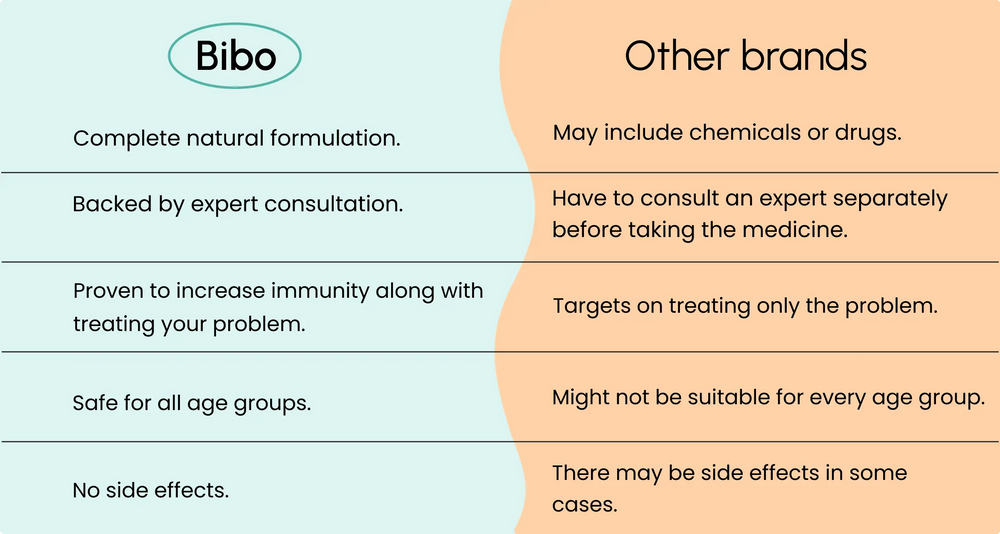
What Are Your Sinusitis Concerns?
Nasal Congestion
Feeling of fullness in the nose? It is a blocked nose due to inflamed sinus passages, causing difficulty breathing. Mucus might also drip down the nasal passage or out of the nose.
Nasal Polyp
Feeling like a small ball is stuck in your nose? These are polyps, harmless non-cancerous growths on the lining of the nose or sinuses.
Sinus Pressure
Pain in cheeks and around the face? This discomfort and fullness in the face is due to the swollen sinus cavities.
Deviated Nasal Septum
Nasal septum (the bone and cartilage that divide the nose in half) is crooked, making one nasal passage smaller?
Identify your problem
How Do I Know I Have Sinusitis?
Watch for signs like stuffy or runny nose, facial pain, pressure, and headaches. If these symptoms persist, see a doctor for a diagnosis.
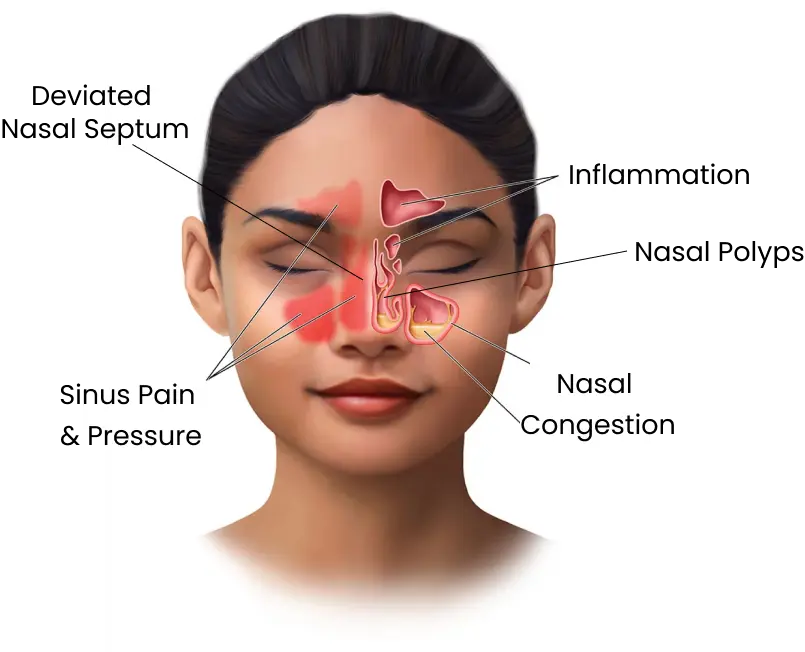
English
Hindi
Our expert talks about
Sinusitis
Causes | Symptoms | Diagnosis
Sinusitis is sinus cavity inflammation due to infection, allergies, or irritants, leading to symptoms like facial pain, congestion, and discoloured mucus. If you are suffering from these persistent symptoms, our team is here to help you!
Find relief for
Sinus Pain & Pressure
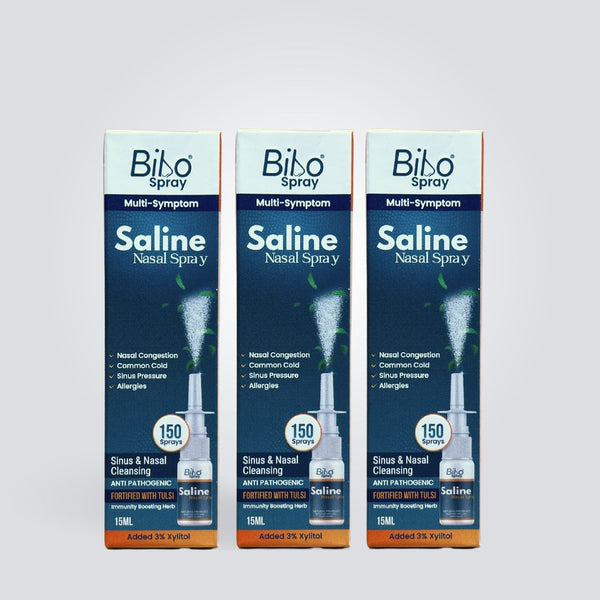
Bibo Saline Nasal Spray
Rs. 369
Multi Symptom | Nasal Hygiene | Anti-Pathogenic
(330 Reviews)
Pack of 3
For daily nasal rinse to wash away allergens and keep the nasal passage clean.
Blocked nose
Nasal rinse
Inflammation

Bibo Breathe Blend
Rs. 152
For Steam & Diffuser | Aroma Therapy | Multiple uses
(5 Reviews)
Pack of 1
Quick relief from cold, cough, or blocked nose through aroma therapy.
Stuffy nose
Chest congestion
Steam inhalation
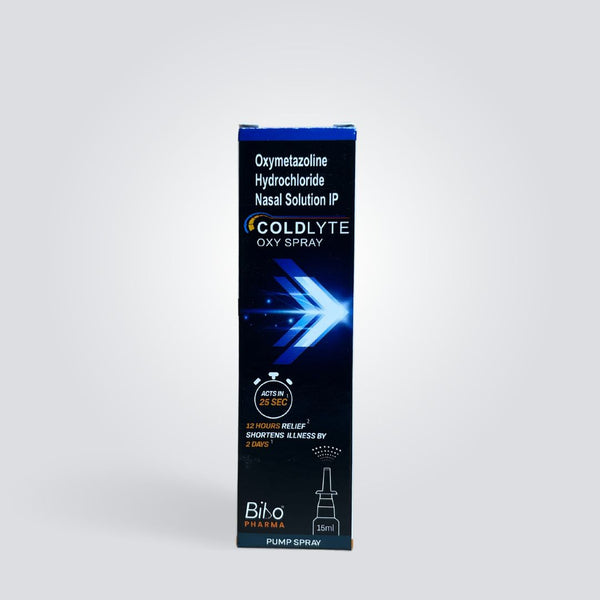
Coldlyte Oxy Spray
Rs. 129
Decongestant Spray | First Pump Spray | 15ML
(9 Reviews)
Pack of 1
Fast-acting decongestant spray for severe nasal congestion with oxymetazoline.
Cold
Allergies
Nasal congestion
Quick relief
Our expert talks about
Nasal polyps
Causes | Symptoms | Diagnosis
Nasal polyps are benign growths in the nasal passages, often caused by chronic inflammation, and they result in nasal congestion, reduced smell, and facial pressure. If you are suffering from these symptoms and want to prevent that situation from worsening, ask our experts for a solution now!
English
Hindi
Find relief for
Nasal Polyp
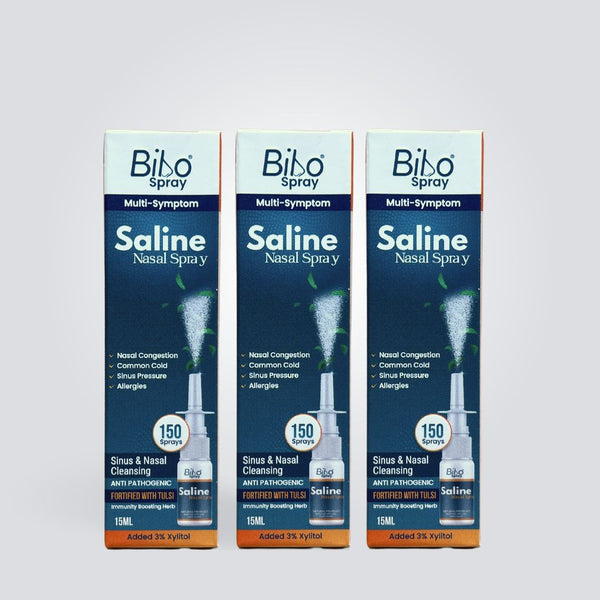
Bibo Saline Nasal Spray
Rs. 369
Multi Symptom | Nasal Hygiene | Anti-Pathogenic
(330 Reviews)
Pack of 3
For daily nasal rinse to wash away allergens and keep the nasal passage clean.
Blocked nose
Nasal rinse
Inflammation

Bibo Breathe Blend
Rs. 152
For Steam & Diffuser | Aroma Therapy | Multiple uses
(5 Reviews)
Pack of 1
Quick relief from cold, cough, or blocked nose through aroma therapy.
Stuffy nose
Chest congestion
Steam inhalation
English
Hindi
Our expert talks about
DNS.
Causes | Symptoms | Diagnosis
A deviated nasal septum is a displacement of the nasal wall, typically caused by injury or genetics. The symptoms include congestion, difficulty breathing, snoring, and recurrent sinus issues. If you observe these symptoms and want to avoid further complications, consult our experts now!
Find relief for
Deviated Nasal Septum

Bibo Saline Nasal Spray
Rs. 369
Multi Symptom | Nasal Hygiene | Anti-Pathogenic
(330 Reviews)
Pack of 3
For daily nasal rinse to wash away allergens and keep the nasal passage clean.
Blocked nose
Nasal rinse
Inflammation

Bibo Breathe Blend
Rs. 152
For Steam & Diffuser | Aroma Therapy | Multiple uses
(5 Reviews)
Pack of 1
For daily nasal rinse to wash away allergens and keep the nasal passage clean.
Stuffy nose
Chest congestion
Steam inhalation
Science vs Myth
Sinusitis has stigma. We are here to provide the science-backed facts.
01
Myth 1: Sinusitis is contagious.
The Fact: It’s not! Sinusitis arises from sinus inflammation or infection, typically not contagious.
Allergies, irritants, or anatomical issues lead to sinusitis, which doesn't transmit between individuals.
However, if the underlying cause of sinusitis is a contagious infection, then that specific infection can be
contagious, but not sinusitis itself.
02
Myth 2: All sinus headaches are caused by the sinusitis
The Fact: No, all sinus headaches are not due to sinusitis! Sinus-like headaches can occur due to
various factors, such as tension, migraines, or environmental triggers. Consulting a healthcare professional
can help determine the specific origin of the headache and guide appropriate treatment.
03
Myth 3: Decongestants spray can help you breathe.
The Fact: Decongestants are drugs that relieve a stuffy nose. They are used for temporary treatment.
They are not effective for long-term treatment due to their toxic effects on the Cardiovascular system.
04
Myth 4: Antibiotics are necessary for sinus infection.
The Fact: Sinusitis is caused by either viral or bacterial infection. Viral infection is temporary
and the patient can recover on its own. Antibiotics are only used when the infection is bacterial and the
patient is not responding to usual medication such as antihistamines, decongestants, and inhaled steroids.
05
Myth 5: Green and yellow mucus indicates bacterial sinusitis.
The Fact: Either the infection is bacterial or viral the colour of mucus remains the same. The colour
of the mucus is due to the dead white blood cells fighting against the pathogens and it is an indication of
chronic sinusitis.
06
Myth 6: Sinus surgery does not work.
The Fact: Surgery is the only treatment when all other methods of treatment fail. Sinus operation is
a successful treatment of chronic sinus infection.






Sinusitis Questions?
Nasal Polyp
Sinus Pain
Sinusitis
DNS
What are nasal polyps?
Nasal polyps are soft, non-cancerous growths that develop in the nasal and sinus passages.
What causes nasal polyps?
While the exact cause is unclear, they are often associated with chronic inflammation related to
conditions like allergies, asthma, or chronic sinusitis.
What are the common symptoms of nasal polyps?
Symptoms may include nasal congestion, loss of smell, runny nose, postnasal drip, facial pressure, and
recurrent sinus infections.
Can nasal polyps be treated without surgery?
Yes, many cases can be managed with medications like corticosteroids, allergy management, and saline nasal
rinses.
What is the surgical treatment for nasal polyps?
Surgical treatment involves endoscopic sinus surgery, performed by an ENT specialist, to remove the polyps
and improve sinus drainage when other treatments are ineffective.
What is sinus pain?
Sinus pain is discomfort or pressure felt in the areas around the nose, cheeks, and forehead, often caused
by inflammation or congestion in the sinus passages.
What are the common causes of sinus pain?
Sinus pain can be caused by sinusitis (inflammation or infection of the sinuses), allergies, colds, or
other upper respiratory conditions.
What are the typical symptoms of sinus pain?
Symptoms may include facial pain or pressure, headaches, a runny or stuffy nose, and sometimes a reduced
sense of smell.
How can sinus pain be relieved at home?
You can try home remedies like saline nasal irrigation, warm compresses, staying hydrated, and using
over-the-counter decongestants or pain relievers.
When should I see a doctor for sinus pain?
If your sinus pain is severe, persistent, or accompanied by a high fever, you should consult a healthcare
professional, as it could be a sign of a more serious sinus infection that requires medical treatment.
What is sinusitis?
Sinusitis, often referred to as a sinus infection, is the inflammation or swelling of the tissue lining
the sinus cavities in the face and skull.
What are the common symptoms of sinusitis?
Common symptoms include facial pain, pressure in the forehead or cheeks, nasal congestion, thick nasal
discharge, headache, and a reduced sense of smell.
What causes sinusitis?
Sinusitis can be caused by viral infections (like the common cold), bacterial infections, allergies, or
irritants that lead to inflammation of the sinus passages.
Is sinusitis contagious?
Sinusitis itself is not contagious, but the underlying viral or bacterial infections that can lead to
sinusitis can be contagious.
How is sinusitis treated?
Treatment may include rest, hydration, over-the-counter or prescription decongestants, saline nasal
irrigation, antibiotics for bacterial infections, and, in some cases, surgery to improve sinus drainage
for chronic or severe cases. Consult a healthcare professional for proper diagnosis and treatment
recommendations.
What is a deviated nasal septum?
A deviated nasal septum is a condition where the wall between the nostrils, called the nasal septum, is
displaced or curved to one side, obstructing one or both nasal passages.
What causes a deviated nasal septum?
A deviated septum can result from injury, congenital factors (present at birth), or simply develop over
time. Trauma to the nose is a common cause.
What are the symptoms of a deviated nasal septum?
Symptoms may include nasal congestion, difficulty breathing through one nostril, recurrent nosebleeds,
snoring, and an increased susceptibility to sinus infections.
Can a deviated nasal septum be treated without surgery?
Mild cases may be managed with over-the-counter or prescription decongestants or nasal corticosteroid
sprays. However, severe cases may require surgical correction to improve breathing.
What does the surgical treatment for a deviated nasal septum involve?
Surgical treatment, known as a septoplasty, aims to straighten or reposition the nasal septum. It is
typically performed by an ear, nose, and throat specialist (ENT) and can often be done as an outpatient
procedure.
Why choose Bibo?
